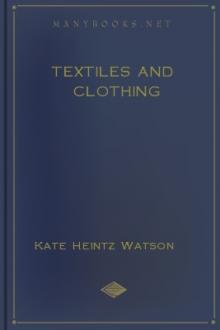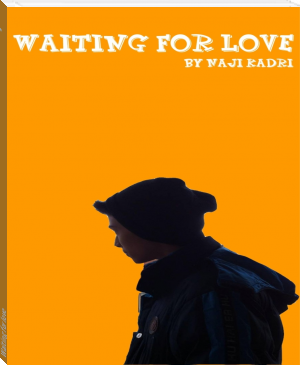Textiles and Clothing - Kate Heintz Watson (open ebook TXT) 📗

- Author: Kate Heintz Watson
- Performer: -
Book online «Textiles and Clothing - Kate Heintz Watson (open ebook TXT) 📗». Author Kate Heintz Watson
Modern Methods
Visit a textile mill if possible, after studying the text.
Practice home dyeing. Read carefully the directions given by the manufacturers of the dyes. See the booklet "Diamond Dyes," to be obtained at many drug stores, or send for it to Wells Richardson, Burlington, Vermont.
References: Text-books of the American School of Correspondence—especially Textile Chemistry and Dyeing. (Parts I, II, III, and IV, postage 4c. each.)
The Dyeing of Textile Fabrics, by Hummell. ($1.75, postage 12c.)
Bleaching and Calico Printing (containing samples), by Duerr. ($4.00, postage 14c.)
Weaves and Fabrics
Show as many different kinds of weaves as possible. Separate the threads and examine under a hand microscope.
Get the local dry-goods or department store to co-operate with you in getting up an exhibit of samples of standard goods—cotton, woolen, worsted, linen, and silk. Label each sample with the width and price.
Test some of the samples of wash goods for fastness to washing and light, by washing in warm water and soap (or boiling in the soap and water) and expose to sunlight all day for three or four days. Keep a part of each sample for comparison.
(Select a composite set of answers to the Test Questions on Part I and send to the School, with report on the supplemental work done and Meetings I and II.)
MEETING IIISewing: Plain Stitches
Send to manufacturers for samples showing the process of manufacture of pins, needles, etc.
Demonstrate different ways of making the same stitches; discuss best methods.
Embroidery
Show how all the embroidery stitches are made.
Get up an exhibit of all kinds of embroidery, including Oriental, Japanese, old samplers, etc.
Have members make Model I, First Series.
References: Home and School Sewing, by Patton. ($0.60, postage 6c.)
School Needlework, by Hapgood. ($0.75, postage 6c.)
Manual of Exercise in Hand Sewing, by Blair. ($1.25, postage 10c.)
Topic: Educational Value of Sewing in the Public Schools.
Methods. See "A Sewing Course," by Mary S. Woolman, Introduction ($3.50, postage 20c.), and "The Teaching of Domestic Science in the United States of America," by Alice Ravenhill, pages 9-10, 43-46. ($0.75, postage 12c.)
MEETING IVHems, Seams, Fastenings, Darning, Patching
Have all members make models II, III, IV, and V.
Previously assign members to furnish models or examples of all other hems, seams, fastenings, patches, darns, etc., illustrated or described in the text, and as many more as possible.
Machine Sewing
Get the local sewing machine agent to give a demonstration of the workings of the attachments of the machine.
(Select models and answers to Test Questions on Part II and send them to the School, with a report of Meetings III and IV.)
MEETING VDressmaking
Get the local dry-goods or department store to lend different kinds of dress forms.
Show how patterns are altered to suit the figure. (See text and "Dressmaking Up to Date.")
As many as possible cut out and begin making a simple shirt-waist or skirt. Show finished garment at next meeting, giving accurate account of cost and time spent.
References: Dressmaking Up to Date, The Butterick Co. ($0.25, postage 8c.)
Sewing and Garment Drafting, by Margaret L. Blair. ($1.25, postage 12c.)
MEETING VIConstruction and Ornament in Dress; Color
Collect illustrations showing good and faulty ornamentation.
Procure samples of fabrics showing good and faulty ornamentation.
Make a color card showing contrast and harmony of color. (See Question 11.)
Children's Clothing
Get up an exhibit of simple and satisfactory clothing for children, including color, material, style and make.
Discuss children's clothes in reference to laundering.
Care and Repair of Clothes
Show examples of successful repairing.
Try some of the methods of cleaning. (See, also Chemistry of the Household pages 73-84.)
(Select answers to Test Questions on Part III and send them to the School, with report on Meetings V and VI.)
INDEXAdulteration of linen, 87
Alpaca, 90
Altering sleeve patterns, 194
Angora wool, 39
Aniline dyes, 79
Arrow heads, 123
Back stitch, 112
Basting, 108
Bibliography, 103, 229
Bleaching, 78
Bobbin, 19
Boning waist, 192
Bow, the, 208
Burling, 83
Bust form, 168
Button holes, 141
large, 145
making, 144
Buttons, sewing on, 145
Carding, 59
Care of clothing, 219
Cassimere twills, 73, 75
Cat stitch, 116
Catch stitch, 116
Chain stitch, 116
Checks, 213
Children's clothes, 216, 217
Cleaning, 59, 221
Collars, 198
putting on, 199
Color in dress, 214
Colors, mordant, 79
Combing, 60
Conventional designs, 213
Costumes, references, 234
Cotton, 29
boles, 32
fibers, 34
Cotton goods, 85
home of, 30
Nankin, 34
sea island, 30
upland, 30
Cross stitch, 120
Cuffs, 196
Cutting table, 168
Darning, 155
on machine, 158
over net, 157
Decorations, placing, 208
Distaff, 12
Double cloth, 77
Draped waist, 192
Drawing tapes, 140
Dressmaking, 167
Dyeing, 78
home, 80
Dyes, aniline, 79
Dyestuffs, natural, 80
Embroidery, 204
as ornament, 204
eyelet, 122
shadow, 123
stitches, 114
Extension hem, 227
Eyelet embroidery, 122
Eyelets, 149
Fabrics, 85
list of, 96 -102
names of, 94
primitive, 27
width of, 93
Facing, bias, 141
skirt, 179
Fastening the thread, 109
Fastenings, 141
Feather stitch, 118
Fibers, 29
cotton, 29
flax, 43
silk, 53
wool, 37
Finishes, 139
Finishing skirt, 179
seams, 196
waist, 192
Finishing, woolens, 83
Fitting, 173, 193
sleeves, 190
waists, 190
Flax, 43
fibers, 47
hackling, 44, 47
Flocks, 83
Folding garments, 220
French hem, 127
knots, 119
seam, 131
Fulling, 83
Fur, 40
Gathering, 111, 138
Gathers, whipped, 127
Gauging, 112
Gigging, 83
Gingham, 86
Grease spots, 122
Hand sewing, 107
Harmony in dress, 215
Harness, the, 70
Heddle, 17
Hemp, 50
Hem stitch, 118
Hems, 123
bias, 124
faced, 124
flannel, 127
French, 127
folding, 123
Hems, rolled, 126
Herringbone stitch, 116
Home dyeing, 80
Hook and eyes, 147
Hydroscopic moisture, 42
Jacquard loom, 70
Joining lace, 160
Jute, 50
Knit goods, 72
Lace, design of, 208
Laces, use of, 207
Laundering, 225
Lengthening garments, 226
Linen, 86
adulteration of, 87
characteristics of, 47
Lining, cutting, 188
Loading silk, 56
Looms, 17
Colonial, 19, 21, 22
development of, 19
diagram of, 23
fly shuttle, 26
four harness, hand, 21
Jacquard, 70
Japanese, 20
modern, 25, 69
Navajo, 18
Swedish hand, 24
Loop stitch, 116
Madder bleach, 78
Machine darning, 158
sewing, 162
Mending, 83, 225
Mitering embroidery, 158
Modern methods, 59
Mohair, 90
Mordant colors, 79
Muslin, 85
Nankin cotton, 34
Natural dyestuffs, 80
Olona, 53
Ornament, 203
embroidery as, 204
fitness of, 209
flowers as, 205
of textiles, 212
Ornamental stitches, 108, 114
Ornamentation, errors in, 204
Outline stitch, 114
Overcasting, 114, 142
Oversewing, 113
Packing clothing, 220
Passementerie, 206
Patching, 149
Patterns, 171
altering, 173
cloth, 174
lengthening, 173
pinning, 176
placing, 176
selection of, 171
testing, 174
use of, 172
Picking, 59
Piled fabrics, 91
Plackets, 135
faced, 137
Plaids, 213
Plain material, 212
Plush, 77
Pressing, 201
board, 168, 201
wet, 202
Primitive methods, 3
Printing, 81
block, 81
machine, 81
warps, 82
Ramie, 50
Raw silk, 56
Reed, 19
Reeling silk, 54
Repairing, 225
Retting flax, 45
Roving, 61
Running stitch, 110
Sateen weave, 79
Satin, 91
stitch, 121
Scouring agents, 41
Sea island cotton, 30
Seams, 128
beaded, 131
felled, 128
flannel, 135
French, 131
lapped, 133
slot, 131
Serges, 88
Seven-gored skirt, 172
Sewing, hand, 107
machine, 162
Sewing machines, 162
care of, 162
types of, 162
use of, 164
Shadow embroidery, 123
Sheep, 39
Shirt waists, cutting, 182
plan for making, 183
Shuttle, 19
Silk, 53
artificial, 58
boiling off, 56
fiber, 53
loading, 56, 90
production, 53
raw, 56
twilled, 91
Silk, wash, 91
Silk worm, 54
Silks, 90
Singeing, 78
Skirt, 172
band, 179
Skirt binding, 180
braid, 180
making, 177
placket, 178
plan of making, 173
stiffening, 178
Sleeve making, 183
patterns, 194
Sleeves, cutting, 194, 195
finish of, 197
pressing,





Comments (0)